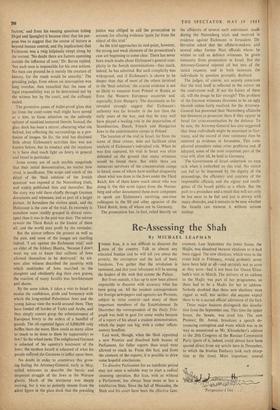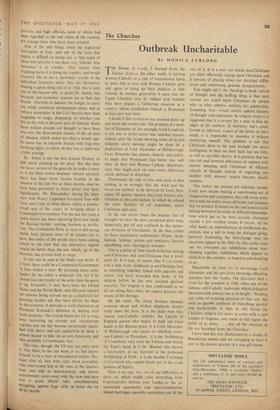Re-Assessing the Shah
By MICHAEL LEAPMAN NSIDE Iran, it is not difficult to discover the
I
state of the country. Talk to almost any educated Iranian and he will tell you about the poverty, the corruption and the lack of basic freedoms. You gather that the revolution is imminent, and that your informant will be among the leaders of the mob that storms the Palace.
But from outside, it has up to now been almost impossible to discover with accuracy what has been going on. All the resident correspondents for foreign newspapers and agencies are Persians, subject to strict control—and many of them important members of the Establishment. In December the correspondent of the Daily Tele- graph was held in gaol for some weeks because of a report of his about a student demonstration, which the paper ran big, with a rather inflam- matory headline.
Last week, though, when the Shah appointed a new Premier and dissolved both houses of Parliament, far fuller reports than usual were allowed to reach us. From this fact, and from the contents of the reports, it is possible to draw some hopeful conclusions.
To dissolve Parliament for an indefinite period may not seem a suitable way to start a radical cleansing operation. But Iran, with or without a Parliament, has always been more or less a totalitarian State. Since the fall of Mossadeq, the Shah and his court have been the effective Govr
eminent. Last September the lower house, the Majlis, was dissolved because elections to it had been rigged. The new elections, which were in the event held in February, would probably never have been held at all—and certainly not as soon as they were—had it not been for Queen Eliza- beth's visit in March. The delivery of an address to the Majlis was part of her programme, so there had to be a Majlis for her to address. Nobody doubted that these new elections were rigged as well, but neither did anyone expect there to be a second official admission of the fact.
Three major features distinguish this dissolu- tion from the September one. This time the upper house, the Senate, was axed too. The new Premier, Dr. Amini, broadcast a speech de- nouncing corruption and waste which was in its way as sensational as Mr. Khrushchev's address to the 20th Congress of the Russian Communist Party (parts of it, indeed, could almost have been quoted direct from my article here in December, to which the Iranian Embassy took such excep- tion at the time). Most important, several generals and high officials, some of whom had been regarded as the real rulers of the country, are among those who have been arrested.
One of the odd things about the high-level corruption in Iran, and one of the facts that makes it difficult to stamp out. is that many of those who, practise it are those very 'liberals' who denounce it so volubly 1 hey realise what crippling harm it is doing the country. and would sincerely like to see it abolished—except in the individual instances where, they are themselves making a good thing out of it And this is only one of the reasons why, to quote Dr. Amini, 'our financial and economic systems are at their last breath Attempts to balance the budget, to carry out wildly ambitious development plans, and to enforce economies in the Civil Service have been laughable or tragic, depending on whether you live in the rich or the poor part of Teheran. Some three million pounds are thought to have been lost over the three-month closure of the oil port of Abadan, which ended less than a month ago. Its cause was an infantile dispute with Iraq over berthing rights, in which all that was at stake was a little prestige.
Dr. Amini is not the first Iranian Premier to talk about cleaning up the place. But this time the heavy arrests of the generals do make it seem as if the Shah means business. Almost certainly there has been more serious trouble in the country in the last two or three months than we have been permitted to know about over here. Significantly. Mr. Khrushchev during his inter- view with Walter 1.ippmann bracketed Iran with Laos and Cuba as three places where a popular revolt was in the course of bringing about a Communist Government. For the last two years a radio station has been operating from just inside . the Russian border, inciting Iranians to revolu- tion. The Communist Party as such is trot strong inside Iran, because most of its leaders arc in Pol. But many of the people have been coming round to the view that any alternative regime Would be better than the one which, up to the moment, has proved itself so inept.
So this can be seen as the Shah's last throw. If it fails, there could be a Communist Government in Iran within a year. By arresting many army leaders he has taken a desperate risk, for if he should lose the loyalty of the army then the game is up. Ironically, it may have been the United States and the World Bank. who this year insisted on reforms being carried out as a condition for granting further aid, that have driven the Shah to this extreme. It provides a vivid illustration of President Kennedy's dilemma in dealing with such countries. The United States has for so long been bolstering up corrupt and incompetent regimes that she has become inextricably identi- fied with them; and any opposition to them is almost bound to take on an anti-American, and thus probably a Communist, bias.
This time, though, the US may get away with it. The Shah, in the last week or so, has shown himself to be a man of unsuspected quality. Per- haps, after all, they were right, those journalists who interviewed him at the time of the Queen's tour, and who so monotonously and almost unanimously came away with the view that here was a good, liberal ruler conscientiously struggling, against huge odds, to better the lot of his people.







































 Previous page
Previous page